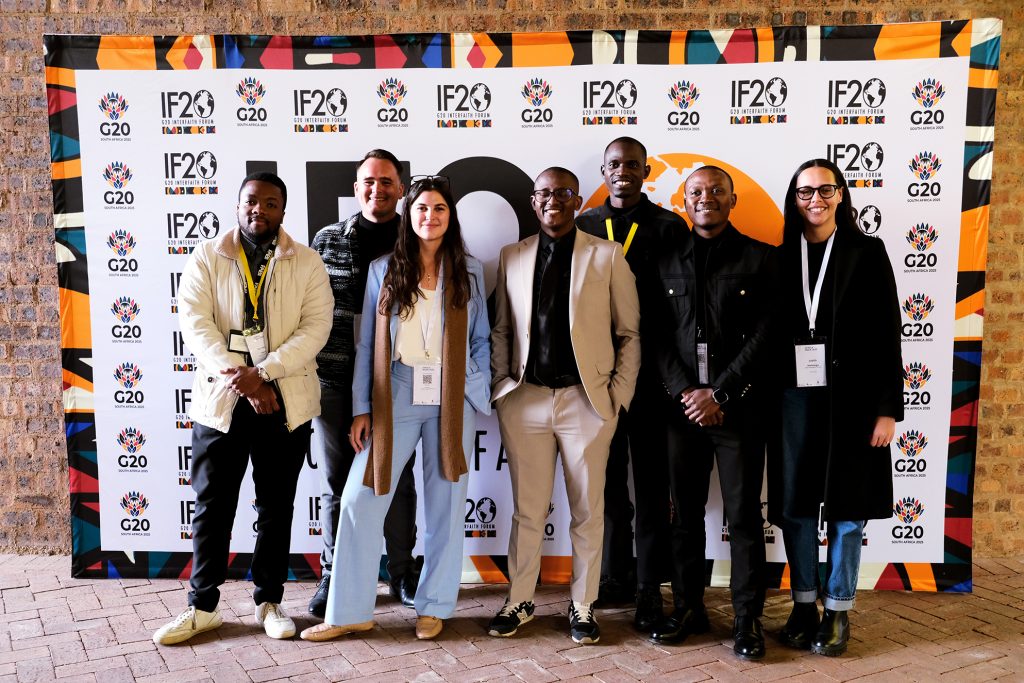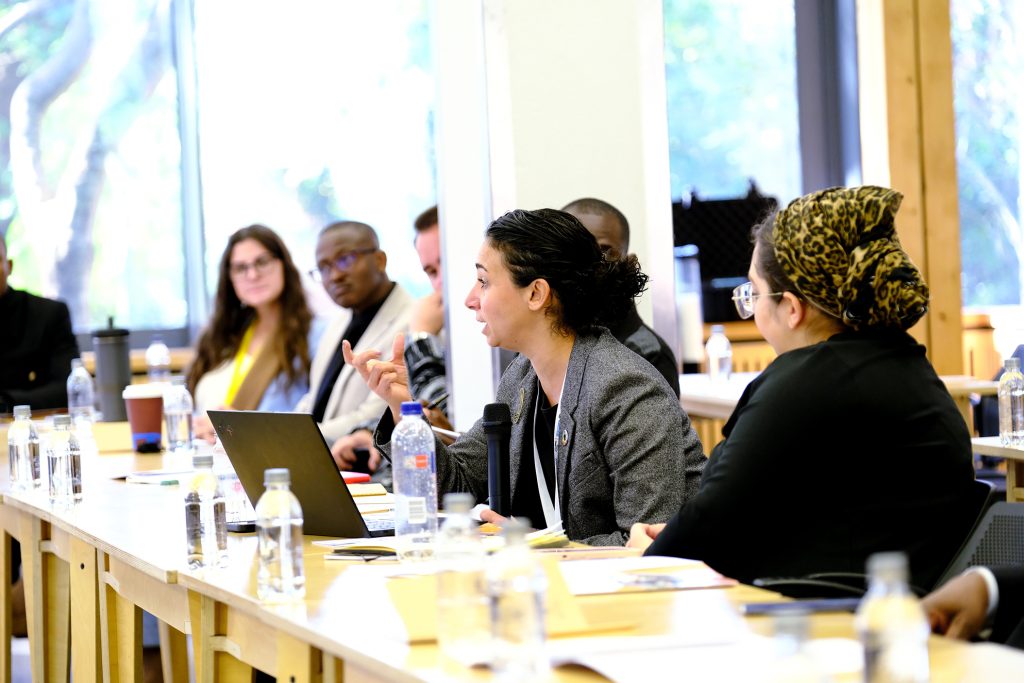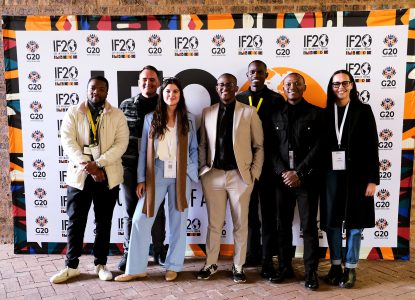By JoAnne Wadsworth, Communications Consultant, G20 Interfaith Forum.
– – –
On May 28-29, 2025, the G20 Interfaith Forum Association hosted Africa Week at Future Africa, University of Pretoria, dedicating significant time to amplifying youth voices on global governance priorities. The session “The Youth’s Voice in Solidarity, Equality, and Sustainability” was moderated by Judith Mahlangu from The Rising Generation and Sandile Makasi, Vice Chair of the IF20 Local Organizing Committee. Three young leaders—Sandile Hlayisi, Babalwa Ngcongolo, and Gabriella Garber Cohen—offered their perspectives on South Africa’s G20 presidency themes, followed by intensive focus group sessions where youth participants developed actionable recommendations for the IF20’s priority areas. This youth-centered approach reflects the recognition that sustainable global governance must meaningfully include the voices and leadership of Africa’s next generation. This represents the fourth and final blog post capturing key insights from this landmark gathering.
Moderators Judith Mahlangu and Sandile Makasi framed the session around South Africa’s G20 presidency themes, explaining: “The themes are solidarity, equality and sustainability and so we’ve asked three youth to come and share with us according to their perspective, what these individual themes mean.”
This structure allowed each young leader to offer deep, personal reflections on concepts that often remain abstract in policy discussions, grounding global governance themes in lived experience and generational perspective.

A Youth Perspective on Solidarity
Sandile Hlayisi addressed the multifaceted nature of solidarity, emphasizing the interconnected roles of personal responsibility, legal frameworks, and collective action. His presentation highlighted how solidarity requires active participation from young people in decision-making processes, particularly in holding leaders accountable for their commitments and actions.
Drawing from personal experiences, Hlayisi illustrated how religious persecution and intolerance create barriers to solidarity, emphasizing the need for empathy, respect for diverse beliefs, and protection of the fundamental right to think freely without fear. His perspective connected individual conscience with broader social cohesion, showing how personal integrity contributes to collective solidarity.
Addressing broader societal challenges such as unemployment and crime, Hlayisi called for shared understanding and concrete, collaborative solutions. He explored how legal frameworks can serve as tools for integration and rehabilitation rather than merely punishment, advocating for a shift from punitive measures to supportive systems that help marginalized individuals become productive members of society.
His comprehensive view of solidarity painted a picture rooted in empathy, action, and inclusive legal and social systems that recognize the dignity and potential of every individual.
A Youth Perspective on Equality
Babalwa Ngcongolo emphasized the importance of fostering equality through empathy, opportunity, and meaningful dialogue. Central to her presentation was the value of intergenerational conversations as a means to bridge divides between youth and older generations, fostering mutual understanding and shared purpose across age groups.
Her discussion highlighted the persistent challenges faced by marginalized communities and stressed the need to ensure equal access to opportunities as a practical expression of equality principles. Rather than focusing solely on legal frameworks, Ngcongolo advocated for compassion and understanding as essential drivers of meaningful equality.
She encouraged a shift in mindset that prioritizes real-world outcomes and opportunities over reliance on legal frameworks alone. This holistic approach, she argued, calls for both systemic change and personal commitment to building a more equitable society through everyday actions and interactions.
Ngcongolo’s perspective demonstrated how equality requires both structural transformation and individual responsibility to create inclusive communities where everyone can thrive.
A Youth Perspective on Sustainability
Gabriella Garber Cohen highlighted the critical importance of sustainability and the shared responsibility across generations to address future challenges. Her presentation emphasized the crucial role of youth engagement in shaping sustainable communities, calling for young people to take initiative and drive positive change in their local contexts.
Cohen recognized the wisdom and experiences of elders as invaluable resources that can guide and inform sustainability efforts, advocating for intergenerational collaboration rather than generational conflict in addressing environmental and social challenges.
A key element of her presentation was the need to integrate sustainability into all areas of study and professional practice. She argued that environmental and social responsibility must become foundational principles embedded in education and career development, ensuring that future leaders are equipped to build a resilient and equitable future.
Cohen’s vision demonstrated how sustainability requires both immediate action and long-term thinking, connecting current choices with future consequences while recognizing the interconnectedness of environmental and social justice.

Focus Group Recommendations: From Vision to Action
Following the individual presentations, youth participants were divided into two groups and given 60 minutes to review the G20 themes of Solidarity, Equality, and Sustainability. Their task was to identify global priorities the IF20 should consider for their recommendations, focusing specifically on actionable solutions.
Emphasis on Urgent Action and Long-term Thinking
The focus group reports emphasized the urgent need for sustainability initiatives while recognizing the importance of intergenerational collaboration in developing and implementing solutions. Participants stressed that current global challenges require immediate attention while also demanding long-term strategic thinking.
The groups highlighted the importance of empowering youth to take responsibility for their communities while simultaneously valuing the wisdom and experiences of older generations. This balanced approach recognizes that effective solutions require both the energy and innovation of youth and the experience and resources of established leaders.
Integration Across All Sectors
A consistent theme emerging from the focus groups was the need to integrate sustainability principles across all fields of study and practice. Participants argued that environmental and social responsibility cannot remain siloed in specific disciplines but must become foundational elements of education, business, governance, and community development.
The recommendations emphasized moving beyond academic or theoretical approaches to sustainability toward practical implementation that connects global goals with local action. This approach recognizes that meaningful change happens when global frameworks are translated into community-level initiatives.
Inclusive Global Policymaking
The focus groups stressed the importance of ensuring that youth voices are meaningfully included in global policymaking processes. Participants were encouraged to consider the perspectives of young people not present in the room and to develop recommendations that have global relevance and applicability.
The collaborative approach taken in the focus groups demonstrated how young people can engage in critical thinking and problem-solving when given structured opportunities to contribute to policy discussions. Their emphasis on practical solutions rather than theoretical frameworks reflects a generation focused on implementation and measurable impact.
Looking Beyond Local Contexts
The session moderators encouraged participants to think beyond their immediate contexts and recognize the potential global impact of their ideas. This challenge helped participants connect their local experiences and insights with broader international frameworks and priorities.
The resulting recommendations reflected this global perspective while remaining grounded in African experiences and values. Participants demonstrated an ability to think strategically about how local innovations and approaches could contribute to international policy development.
The Path Forward: Turning Insights into Action
The session concluded with clear next steps for incorporating youth recommendations into the IF20’s broader policy development process. The moderators emphasized the significance of the participants’ contributions and encouraged them to continue engaging with global governance processes beyond this single forum.
The comprehensive nature of the youth presentations and focus group work demonstrated that Africa’s next generation is ready and capable of meaningful participation in global governance. Their perspectives brought fresh approaches to persistent challenges while showing deep understanding of the complexity of international cooperation.
– – –
JoAnne Wadsworth is a Communications Consultant for the G20 Interfaith Forum Association and Editor of the Viewpoints Blog.


